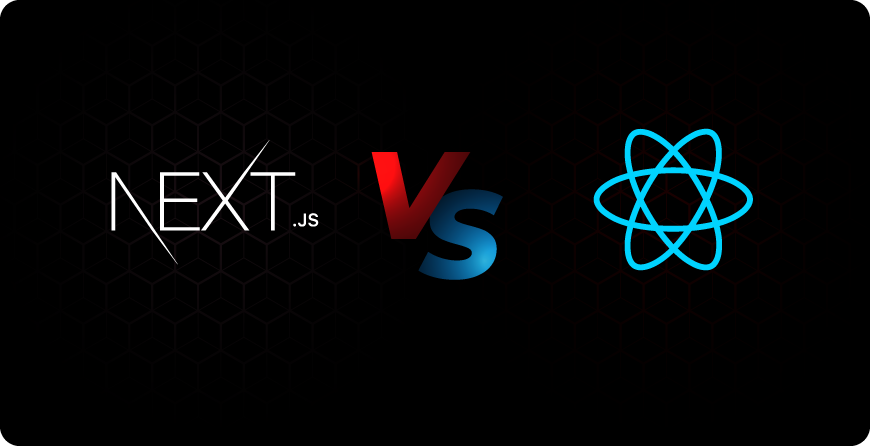Introduction
Next.js and React are two of the most popular front-end web development frameworks. And the debate between Next.js vs React has been around for a while. In short, to understand next.js vs react, Next.js is a simplified development environment built on top of React.
This article will focus on concluding the debate of Next.js vs React. It will show you the advantages and disadvantages of combining Next.js and React’s native capabilities, to end the doubts regarding Next.js vs React, as well as provide you with some insight into whether these two technologies are the best fit for your needs.
Framework vs Library: Next.js vs React
To begin, we must distinguish Next.js vs React on a fundamental level:
What is Next.js?
Vercel built the Next.js framework. It’s free and open-source, and it works with React to develop single-page apps. It’s developed on Node.js and Babel. Apart from that, Next.js provides static export and pre-rendering, as well as a variety of other useful features such as automatic building size optimization, faster developer compilation, and a preview mode.
What is React?
React was established by Facebook and has since grown to become one of the most popular front-end libraries available. With frameworks like Redux, React can simply be extended to integrate functionality like routing and state management patterns. React has a small footprint, but it can be tailored to practically any project. But what is React programming language and why to us it?
So basically, to understand Next.js vs React more clearly, we can say that, Next.js is built on top of React, extending its capabilities and speeding up the development process: React does not need to operate with Next.js, but Next.js deploys projects using React. Simply put this is the main point on Next.js vs React. Next.js is a server-side rendered app framework built on React. The app’s core is still React, but Next.js defines the structure and navigational methods – the architecture.
What Are The Differences Between Next.js vs React projects?
Installing Node.js on your machine and running npx create react app my-app will get you started with React. This will establish a basic project structure, with the src/App.js file serving as the application’s entry point.
You can get started with Next.js by typing npx create-next-app. This will scaffold a project that already contains a pages folder for pages or routes, as well as a public directory for assets.
Advantages and Disadvantages: Next.js vs React
Having a clear understanding of the advantages and disadvantages of Next.js vs React will help you get a proper comparison.
Next.Js
Advantages
Easy coding
Next.js takes less code than React and other frameworks that work with React. This is an important point while comparing Next.js vs react. Developers need to only build the site and link to the element in the header, resulting in less code, higher readability, and better project management.
Speed
Because of Server-side Rendering and Static Generation, Next.js applications are quick and provide a wiser approach to handling data. Performance is also improved by native image optimization features.
Support of API
Third-party APIs can broaden the scope of your project, and Next.js makes it simple to connect to them, allowing you to construct your API routes.
Easy customization and deployment
Next.js is extremely customizable thanks to plugins like Babel. Deployment is designed to be straightforward and intuitive, allowing applications to be launched rapidly.
Improved image optimization
Images are scaled and supplied using the best, most up-to-date formats, such as WebP (while being open to new formats), and images are adjusted to fit into smaller viewports.
Disadvantages
- – The community is modest, but it is expanding by the day as Next.js becomes one of the most widely used online building pieces. Although there are fewer Next.js experts than there are for React or other frameworks, it is far from new. The demand for Next.js developers is growing, which means there are more chances for individuals wishing to make a name for themselves in modern application development.
- – The js routing system is just a file system, which is insufficient for some tasks. Because Node.js is the technology to have on hand for creating dynamic routes, developers must be able to use it.
React
Advantages
Easy coding
React made web application creation simple, thanks in part to the usage of JavaScript, which allowed developers to construct dynamic apps with less code and a familiar language in less time.
Community
A vibrant community makes numerous learning and production resources available.
Personalization
It comes with a set of features that can be enhanced by using other tools such as Redux.
Disadvantages
- – It’s a beginning point; React is a user interface development library, thus it requires additional tools to reach its full potential.
- – Documentation that is out of date – Because its development cycles are so short, the documentation that is supplied is quickly out of date. The active community responds quickly to any inquiries or concerns, but it also necessitates regular relearning of its aspects.
Which is Comparatively Better: Next.js vs React
Next.js aids SEO by providing greater performance than React JS, which implies that if you construct a website with Next JS rather than React JS, your website will have a better chance of ranking higher on Google. In this case, Next.js scores amongst Next.js vs React.
So, does this imply that everyone should convert to Next JS entirely? Not really, it all depends on the website you’re building. If you’re dealing with a lot of API data handling, Next JS would be a fantastic pick because it supports SSR (Server Side Rendering), whereas React JS doesn’t (Note that using SSR can drastically improve the performance of your website, thus improving SEO), but if you’re developing a simple static site with no API integrations, React would be ideal because it supports SSR.
Performance: Next.js vs React
There is no right or wrong answer to this issue because it depends totally on what you’re attempting to accomplish and what you’ll need to accomplish it. Next.js and React are extremely useful technologies, but only for specific purposes.
Next.js apps are extremely quick due to static web pages and server-side rendering. They work by default, thanks to a slew of performance-enhancing technologies like Image Optimization, which debuted in Next 10.
As a result, if you use Next.js, you’ll get automated server rendering and code splitting. Furthermore, SSR (Server Side Rendering) will significantly increase your application’s performance.
When it comes to React, there are a few things that rule it out of the discussion. It only offers client-side rendering by default, which is insufficient for building a high-performance application.
Features of Next.js vs React
Next.js Features
The advantages of Next.js over competing frameworks are due to a collection of unique features. The most important are:
- – Data retrieval – JavaScript uses two methods of pre-rendering to organize data for maximum speed. Server-side rendering and static generation.
- – Next, we’ll talk about configurability. The fact that Next.js is very configurable does not imply that it is difficult to use. Routing is as easy as making a folder.
- – Typescript – TypeScript is a JavaScript-based programming language. One of the reasons for Next.js’ popularity among developers is that it supports Typescript.
React Features
With frameworks like Redux, React can simply be extended to integrate functionality like routing and state management patterns. React is a lightweight framework that can be applied to nearly any project.
Ease of Use: Next.js vs. React
To be honest, a well-written learning resource will shorten your learning curve significantly. Furthermore, you are lucky if your technology comes with a library of guidelines, videos, or courses.
What’s the difference between Next.js vs React? We’ve already stated that both of these have excellent learning materials.
The difficulty level of React is really low. Although using Next.js requires some training, even newcomers to the front-end world may get up and running quickly.
Development Costs: Next.js vs React
Neither Next.js nor React appear in the top-paying technologies list. Furthermore, both are open-source, which implies they are both free. As a result, developing an app with any of these options will not be prohibitively expensive.
The only difference between Next.js vs React is that finding competent Next.js developers takes time, whereas surfing through hundreds of React programmers takes a few days.
Community: Next.js vs. React
You may rely on a large community of developers that have published blog posts and YouTube videos for React. You can also find information on Stack Overflow and in the official React documentation. As the library became older, years of development were required.
There are fewer formal tutorials for Next.js, however, there are more queries and discussions on GitHub. In the open-source environment, the members of the Next.js team are quite approachable.
Summary: Next.js vs React
In their ways, both React and Next.js provide significant potential for developers. React allows you to design things any way you want and is supported by a large community. Next.js makes your life easier by providing a variety of tools and conventions right out of the box, and it’s backed up by a vibrant open-source community.
To summarise, Next.js provides more capabilities and tools for working behind the scenes, but React.js has more resources for working on the front end of your web or mobile application.
Any project would benefit greatly from the use of React. What’s more, if, given the chance, it can scale up as well. React offers more flexibility than Next. Because it is a library, JavaScript is used. It is up to the engineer to decide whether or not to use it.
I hope this article on Next.js vs React has given you the knowledge and some insights on how and why these technologies are used by many organizations. Best of luck with your upcoming project!





